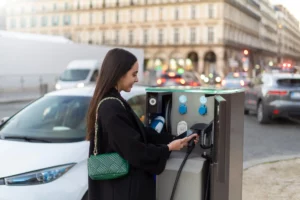
Home / EV Charging News / Electric Cars and Smart Parking Solutions: Enhancing Charging Infrastructure Through Integrated Smart Parking Management
As electric vehicles (EVs) gain momentum on the road towards a sustainable future, the need for efficient charging infrastructure becomes increasingly evident. One ingenious solution lies in the integration of EV charging stations with smart parking management systems. This article explores the potential synergy between electric cars and smart parking solutions, emphasizing how this integration can optimize parking space utilization and enhance charging availability.
The convergence of electric vehicles and smart parking solutions signifies a pivotal shift in how we approach transportation and urban planning. By embracing the potential of smart infrastructure, we are not only reducing the carbon footprint of vehicles but also fostering efficient energy utilization. As more cities and communities recognize the value of integrating electric cars with smart parking management systems, we move closer to a future where electric mobility is not just sustainable, but also intelligent, responsive, and seamlessly integrated into our everyday lives.
The journey towards a cleaner and smarter transportation ecosystem relies on the amalgamation of innovative technologies and conscious urban planning. Electric cars and smart parking solutions exemplify this synergy, demonstrating that a future of sustainable mobility is within our reach. By fostering collaboration, investing in infrastructure, and promoting user adoption, we can create a roadmap that leads us away from fossil fuel dependency and towards a future where electric vehicles and smart parking systems coexist harmoniously to shape a cleaner, greener, and more intelligent world.
As electric vehicles become increasingly integrated into our transportation landscape, their successful adoption relies on the evolution of charging infrastructure. Smart parking solutions offer a compelling avenue to address the challenges of charging availability and space utilization. By seamlessly integrating EV charging stations with smart parking management systems, cities and communities can pave the way for a more convenient, efficient, and accessible electric mobility future. Through this synergy, we can drive towards a world where electric cars not only reduce emissions but also harmonize with intelligent urban planning for a smarter and greener tomorrow.
